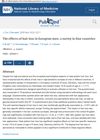 215 citations
,
November 2006 in “Journal of The American Academy of Dermatology”
215 citations
,
November 2006 in “Journal of The American Academy of Dermatology” Dutasteride more effective for hair growth, but has more side effects than finasteride.
 99 citations
,
October 2006 in “BMC clinical pharmacology”
99 citations
,
October 2006 in “BMC clinical pharmacology” Finasteride may cause slight depression and anxiety.
 66 citations
,
June 2006 in “Journal of The American Academy of Dermatology”
66 citations
,
June 2006 in “Journal of The American Academy of Dermatology” Finasteride increases hair weight and count in men with hair loss, with best results after four years.
 30 citations
,
March 2006 in “Dermatologic Surgery”
30 citations
,
March 2006 in “Dermatologic Surgery” Finasteride improves surrounding scalp hair and increases hair density after hair transplant.
 12 citations
,
October 2004 in “PubMed”
12 citations
,
October 2004 in “PubMed” Finasteride, especially in a 1mg dose, effectively slows hair loss and improves hair growth in Japanese men with male pattern hair loss.
22 citations
,
July 2003 in “PubMed” Finasteride 1 mg significantly improves hair growth in men aged 41 to 60 with male pattern hair loss.
 174 citations
,
November 2002 in “Expert Reviews in Molecular Medicine”
174 citations
,
November 2002 in “Expert Reviews in Molecular Medicine” Hair loss needs more research for better treatments.
15 citations
,
April 2002 in “PubMed” Finasteride effectively treats male pattern hair loss without serious side effects.
 66 citations
,
April 2002 in “Journal of The American Academy of Dermatology”
66 citations
,
April 2002 in “Journal of The American Academy of Dermatology” Finasteride increases hair weight and count in men with hair loss.
2 citations
,
January 2002 in “The Chinese Journal of Clinical Pharmacology” Finasteride effectively improves hair growth in men with minimal side effects.
 36 citations
,
September 2001 in “Journal of The European Academy of Dermatology and Venereology”
36 citations
,
September 2001 in “Journal of The European Academy of Dermatology and Venereology” Finasteride doesn't reduce sexual function in people with hair loss.
 129 citations
,
October 2000 in “British Journal of Dermatology”
129 citations
,
October 2000 in “British Journal of Dermatology” Finasteride helps increase hair growth in men with hair loss.
 18 citations
,
March 2000 in “PubMed”
18 citations
,
March 2000 in “PubMed” Hair loss significantly affects European men's self-esteem and concern about aging, with these feelings being common across four countries.
 30 citations
,
December 1999 in “International Journal of Dermatology”
30 citations
,
December 1999 in “International Journal of Dermatology” Finasteride increases hair count in middle-aged and elderly men without causing sexual dysfunction.
 145 citations
,
December 1999 in “Journal of Investigative Dermatology Symposium Proceedings”
145 citations
,
December 1999 in “Journal of Investigative Dermatology Symposium Proceedings” Finasteride 1mg helps reverse hair miniaturization in men and postmenopausal women.
 65 citations
,
October 1999 in “Journal of The American Academy of Dermatology”
65 citations
,
October 1999 in “Journal of The American Academy of Dermatology” Finasteride effectively reduces hair loss by decreasing androgen levels.
 46 citations
,
October 1999 in “Journal of The American Academy of Dermatology”
46 citations
,
October 1999 in “Journal of The American Academy of Dermatology” Finasteride effectively treats male pattern hair loss with a 1 mg daily dose.
 100 citations
,
September 1999 in “British Journal of Dermatology”
100 citations
,
September 1999 in “British Journal of Dermatology” The study found that two enzymes linked to hair loss are located in different parts of the scalp, supporting a common treatment's effectiveness.
 187 citations
,
June 1999 in “Journal of The American Academy of Dermatology”
187 citations
,
June 1999 in “Journal of The American Academy of Dermatology” Finasteride effectively treats frontal hair loss with few side effects.
 581 citations
,
October 1998 in “Journal of The American Academy of Dermatology”
581 citations
,
October 1998 in “Journal of The American Academy of Dermatology” Finasteride safely and effectively treats male pattern hair loss, but may cause reversible sexual issues and harm male fetuses.
 36 citations
,
January 1998 in “Journal of Dermatological Treatment”
36 citations
,
January 1998 in “Journal of Dermatological Treatment” The questionnaire effectively measures men's perceived hair growth and can distinguish between different treatments and dosages.
 74 citations
,
January 1998 in “Dermatology”
74 citations
,
January 1998 in “Dermatology” Men who think they are losing hair feel worse about themselves, especially if they are younger.
 416 citations
,
September 1997 in “Journal of Investigative Dermatology”
416 citations
,
September 1997 in “Journal of Investigative Dermatology” People with hair loss have more androgen receptors and enzymes in certain follicles, with men and women showing different patterns.
 102 citations
,
October 1996 in “Dermatologic Clinics”
102 citations
,
October 1996 in “Dermatologic Clinics” Photographic documentation crucial for evaluating hair growth in androgenetic alopecia.
 80 citations
,
January 1995 in “The American Journal of Medicine”
80 citations
,
January 1995 in “The American Journal of Medicine” Hair loss in androgenetic alopecia is caused by genetic factors and androgen excess, and can be treated with combined therapies.
 192 citations
,
June 1992 in “Journal of The American Academy of Dermatology”
192 citations
,
June 1992 in “Journal of The American Academy of Dermatology” Hair loss can cause low self-esteem, anxiety, and depression in men.
34 citations
,
December 1991 in “Annals of the New York Academy of Sciences” Differences in enzyme activity and androgen receptors in hair follicles may explain why hair loss appears differently in men and women.
203 citations
,
November 1984 in “Journal of the American Academy of Dermatology” Common baldness is likely inherited through multiple genes, not just one.































